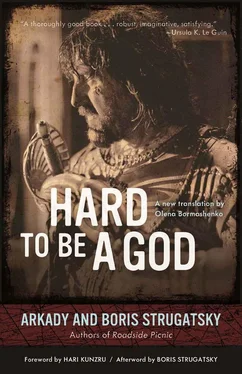“Thus, you refuse to confess,” said Don Reba.
“To what?”
“To being an impostor.”
“Honorable Reba,” Rumata admonished, “such things need to be proved. You’re insulting me!”
Don Reba’s expression turned cloying. “My dear Don Rumata,” he said. “Forgive me, I will keep calling you by that name for the time being. Anyway, I usually don’t prove a thing. They prove things elsewhere, in the Merry Tower. For this purpose, I keep experienced, well-paid professionals, who are capable of using Holy Míca’s Meat Grinder, the Greaves of Our Lord, the Gloves of the Great Martyr Pata, or, say, the Benches… uhhh … I’m sorry, the Chairs of Totz the Warrior to prove anything whatsoever. That God exists and that God doesn’t exist. That people walk on their hands and people walk on their sides. Do you see what I’m saying? You may not be aware of this, but there’s a whole science devoted to obtaining proofs. Judge for yourself: why would I prove what I already know? And after all, a confession isn’t dangerous for you.”
“It’s not dangerous for me,” said Rumata. “It’s dangerous for you.”
Don Reba pondered for some time. “All right,” he said. “It appears I’ll have to start after all. Let’s see what Don Rumata of Estor has been observed doing in the five years of his afterlife in the Arkanarian kingdom. And then you will explain to me the meaning of it all. Agreed?”
“I don’t want to make any rash promises,” Rumata said, “but I’m interested in hearing you out.”
Don Reba rummaged in his desk, pulled out a square of thick paper, and, raising his eyebrows, scanned it. “Let it be known to you,” he said, smiling amiably, “let it be known to you that I, the Minister of the Defense of the Arkanarian Crown, undertook certain actions against the so-called bookworms, scientists, and other worthless people detrimental to the state. These actions met with some strange resistance. At the same time as the whole nation acted in concert and, remaining faithful to the king and the Arkanarian traditions, helped me in any way possible—betrayed the hidden, meted out their own justice, directed me to suspicious characters that had escaped my attention—at this same time, some unknown but highly energetic person snatched the most important, most inveterate and abominable criminals from under our noses and then sent them outside the kingdom. In this way, the following people slipped through our fingers: the godless astrologer Bagheer of Kissen; the criminal alchemist Sinda, who had been proven to have dallied with the devil and with the Irukanian regime; the vile pamphleteer and disturber of the peace Zuren; and a number of others of lower rank. The crazy sorcerer and mechanic Cabani disappeared somewhere. Someone spent a fortune in gold to prevent the people’s wrath from being carried out against the godforsaken spies and poisoners, the former healers of His Majesty. Under truly fantastical circumstances, forcing one to again recall the enemy of the human race, someone liberated the monster of depravity and corrupter of men’s souls, the leader of the peasant revolt Arata the Hunchback…” Don Reba stopped and, moving the skin on his forehead, looked at Rumata significantly. Rumata, looking up at the ceiling, smiled dreamily. He had abducted Arata the Hunchback by coming for him in a helicopter. This had made a stupendous impression on the guards. On Arata, too, to be honest. That really was well done, he thought. I have done good work.
“Let it be known to you,” Don Reba continued, “that the said Arata is now personally leading the mutinous slaves through the eastern areas of the metropole, spilling an abundance of noble blood, experiencing no shortage of either money or weapons.”
“I can easily believe it,” Rumata said. “He immediately struck me as a very determined man.”
“So you confess?” Don Reba said immediately.
“To what?” Rumata asked in surprise.
They looked each other in the eye for some time.
“I will go on,” said Don Reba. “The rescue of these corrupters of souls cost you, Don Rumata, according to my humble and incomplete estimates, no less than one hundred pounds of gold. I won’t mention the fact that in doing so you have forever polluted yourself by consorting with the devil. I also won’t mention the fact that for the entirety of your stay in the Arkanarian kingdom you haven’t received a single penny from your estate in Estor, and why should you have? Why send a dead man money, even if he’s family? But your gold!”
He opened a jewelry box that was buried beneath the paper on the desk and extracted from it a handful of gold coins with the profile of Pitz the Sixth.
“This gold itself would be enough to burn you at the stake!” he shrieked. “This is the devil’s gold! Human hands are incapable of producing metal of such purity!”
He was glaring at Rumata. Yes, thought Rumata generously, that’s well done. That’s something we probably should’ve thought of. And he’s probably the first to notice. We must take that into account.
Reba suddenly calmed down again. Sympathetic paternal notes came into his voice. “And you’ve always been so very imprudent, Don Rumata. This entire time, I’ve been so worried about you. Such a duelist, such a troublemaker! A hundred and twenty-six duels over five years! And not a single man killed. Someone could eventually draw conclusions from that. I did, for example. And I wasn’t the only one. For example, tonight, Brother Aba… it isn’t nice to speak ill of the dead, but he was a very cruel man. I found it difficult to tolerate him, I admit. Anyway, for your arrest Brother Aba chose not the most capable fighters but the fattest and the strongest. And he turned out to be right. A few dislocated arms, a few crushed necks, missing teeth are no concern… and here you are! And you must have known that you were fighting for your life. You’re a master. You’re doubtlessly the best swordsman of the empire. You have doubtlessly sold your soul to the devil, for it is only in hell that you could have learned these incredible, fabulous methods of battle. I’m even ready to allow that you got this ability under the condition that you do not kill. Although it’s hard to imagine why the devil would impose such a condition. But let our scholars figure that out—”
He was interrupted by a shrill, piglike squeal and glanced at the lilac curtains, displeased. There was a fight behind the curtains. They could hear dull blows, shrieks of “Let me go! Let me go!” and other hoarse voices, swearing, and exclamations in a strange dialect. Then a curtain snapped off and fell on the floor. Some man burst into the office, collapsing onto all fours—he was bald, with a bloodied chin and wildly bulging eyes. Huge paws reached out from behind the curtain, grabbed the man’s legs, and pulled him back. Rumata recognized him as Budach. He was shrieking wildly: “You lied to me! You lied to me! It was poison! Why?”
He was dragged into the darkness. A man in black quickly picked up and hung the curtain. Silence fell, then a disgusting noise came from behind the curtains—someone was retching. Rumata understood.
“Where’s Budach?” he asked sharply.
“As you can see, some misfortune seems to have befallen him,” Don Reba answered, but it was evident that he was caught off guard.
“Don’t even try it,” said Rumata. “Where’s Budach?”
“Oh, Don Rumata,” Don Reba said, shaking his head. He had already recovered. “What do you want Budach for? What is he, related to you? You’ve never even seen him.”
“Listen, Reba!” Rumata said furiously. “I’m not kidding around! If anything happens to Budach, you’ll die like a dog. I’ll crush you.”
Читать дальше












